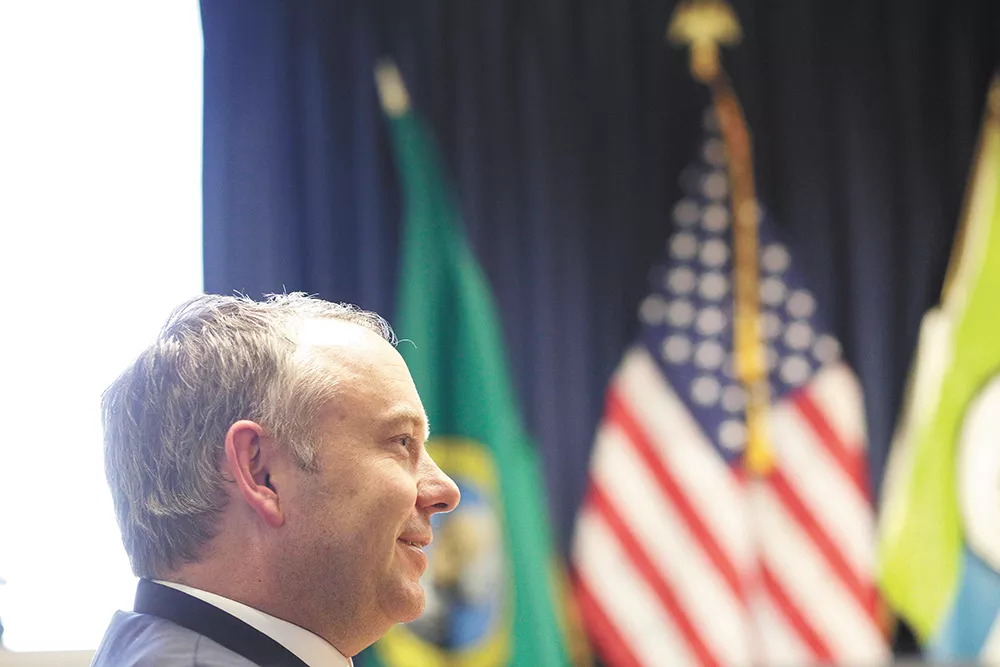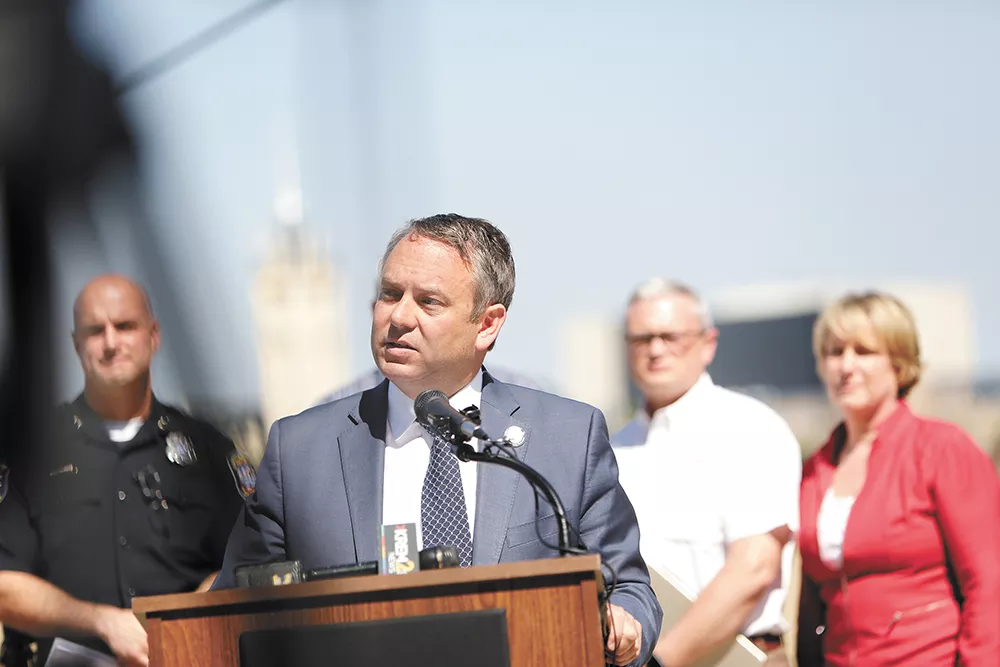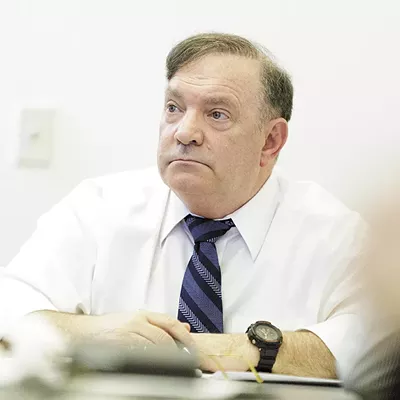
A legacy — of a mayor or any other leader — is not just about a list of accomplishments. Perhaps, more than anything else, a legacy is about timing.
If Mayor David Condon's tenure had ended in his first year in office — in 2012 — he could have gone down in Spokane history as a mayor who was willing to make the hard choices, who cut deep to balance the budget and ushered in an era of more efficient government.
If it had ended in 2014, he could have been the "environmental mayor," the leader who managed to meld environmental idealism with budget-conscious conservativism, who gave us prettier parks, better streets and a cleaner river.
If his final term had ended in mid-2016, he could have been remembered for a sexual-harassment scandal that tarred his handpicked police chief and raised questions about whether Condon's administration intentionally delayed releasing public records about it until after his re-election.
And if it had ended in mid-2017, he could have been seen as the mayor who set the city on a path to finally end homelessness — or at least dramatically reduce it.
As it stands, Condon's legacy hangs in contradiction. Condon's successor, Nadine Woodward, ran a campaign that argued that the city — particularly downtown — was beset by an exponential increase in crime, addiction and homelessness. And Condon campaigned for her.
So as Condon leaves office as the first two-term mayor since the '70s, he leaves behind both a long list of accomplishments and a tangle of conflict and controversy.
THE STRONG MAYOR ERA
Maybe it's fitting for a dry, chart-and-jargon leader like Condon that one of his most revolutionary decisions involved something as boring sounding as Combined Sewer Overflow, or CSO, tanks.
Running for office eight years ago, Condon, like many politicians before and after him, made a lot of big promises. Mayor Mary Verner's administration presented voters with the possibility of double-digit utility rate increases to meet requirements mandating that Spokane stop dumping so much filthy stormwater and sewage into the river, but Condon told voters that all that was unnecessary. Vote for him, and he'd find a different way to get it done.
But then he won, and he had to figure out a way to actually do it.
The experts — some of them anyway— said it couldn't be done, that taxpayers would have to pay for steep rate increases to pay for giant CSO tanks to temporarily store the surge of dirty water during storms instead of letting it slosh into the river.
"'You're just going to have to tell the public this is how much this is going to cost,'" Condon recalls being told.
But Condon didn't budge. He refused to accept a utility rate increase faster than inflation.
Gavin Cooley, Condon's eager and optimistic chief financial officer, remembers a room of longtime utilities staffers exploding when he told them of the standard the new mayor wanted them to meet, telling him that Condon was going to be responsible for "boiled water scenarios."
Finally, the staff came up with a solution: Build smaller, cheaper, CSO tanks, but renovate roads with features like grassy trenches that absorbed water instead of just dumping it into the drain.
It was a policy that simultaneously saved the city money and helped fight potholes and cleaned up the Spokane River and provided new miniature parks built on top of the tanks.
"This is a generational investment, one that we can't easily repeat, at least not for a long time," Condon told members of Congress earlier this year.
But getting it done required something like a bureaucratic miracle: It meant busting down the walls separating departments, merging pools of money, and persuading the state Department of Ecology.
"I think it was ballsy to set utility rates at 2.9 percent and convince Ecology and EPA that we could deliver that," says Theresa Sanders, Condon's blunt, hard-charging city administrator.
And much of Condon's first term was like that: Verner had been proud of avoiding layoffs. But Condon's first budget, in the depths of recession, slashed entire departments, eliminating 152 positions to get the city on firmer financial ground. He went toe-to-toe with the unions, refusing to sign contracts that exceeded the city's long-term growth projections.
"I'm the only mayor who ever rewrote retirement," Condon says.
He chipped away at the positions employed by civil service, a formalized bureaucracy that requires a formal procedure to hire and fire people, and replaced them with highly paid "exempt" positions who could be picked or move at will. It gave Spokane's "strong mayor" position more strength than ever.
Condon says he sought to be "transformational." In each city department he began tracking "performance measures," to try to spot where the city was lagging and what needed to be fixed.
He thought about these things nonstop, Cooley says. Pity the poor staffer who sat next to him on an airplane.
"You're flying back and it's 11 o'clock at night, and he's still focused on, 'What about this issue? What about that issue?'" Cooley says.
The first term had its hiccups, of course. When Condon tried to reorganize the Fire Department, the fire union successfully sued him. He was also criticized for not fighting harder for stronger police oversight.
But at the same time, Condon also managed to do things like convince voters to pass bonds that paid for new streets and an upgraded Riverfront Park without raising taxes.
So Condon did what no other Spokane mayor has in over 40 years: He got re-elected. And that's when the trouble started.
THE STRAUB SCANDAL ERA
Shortly before his re-election, Condon held a press conference announcing the forced resignation of Police Chief Frank Straub, citing complaints about his management style. When the Inlander asked the mayor directly whether there were "any sexual harassment complaints lodged against Frank," Condon responded with a blunt, "no."
Indeed, Sanders told the Spokesman-Review that she wasn't aware of any issues between Straub and former police spokeswoman Monique Cotton, who was suddenly moved to the parks department. Condon's spokesman assured the Inlander that the move was "strictly managerial... end of story."
It was only after Condon's re-election that the city released public records that revealed the truth: Sanders' handwritten notes showed Cotton had been reassigned after she told the city that Straub had allegedly "grabbed her ass and tried to kiss her," though Cotton didn't want a formal investigation.
The revelation triggered nearly a year of ethics hearings, lawsuits, a recall attempt and an independent investigation from a former federal prosecutor. The investigation concluded that Sanders and the former city attorney had "intentionally withheld" the information until after Condon's re-election.
Today, Sanders continues to deny meddling with the records process, but also says she doesn't regret not being initially truthful with the public.
"I think I did the right thing," Sanders says, noting that Cotton had asked her not to tell. Today, city policy requires her to share claims about sexual harassment, even if the complainant wants her to promise to keep it secret. But Sanders worries that's a step backward.
"I think there's a chilling effect," Sanders says. She calls Condon a "courageous mayor" for sticking by her through the controversy.
It's the one area of his tenure that Condon was wary of discussing.
"I'm not going to rehash, you know, individual personnel matters," he says.
When the Inlander asks Condon the same question it did in 2015 — "Were there any sexual harassment complaints lodged against Frank?" — Condon declines to answer.
"I've answered all those questions at the time," Condon says.
And asked if he believes he was honest with the public, he answers "yes," just as swiftly and unequivocally as he had denied there'd been any sexual harassment complaints four year earlier.
The Straub scandal eventually disappeared from the headlines, but left behind a lingering aftertaste of distrust.
At one time, Condon says, you could have "frank decisions" in "executive sessions," but today that's "no longer a reality." Council members voted to waive the privacy of closed-door executive sessions so they could discuss them with the Straub scandal investigator.
The council didn't trust that the mayor's office would tell them the truth, Councilman Breean Beggs says, while the mayor's office seemed worried that the council was trying to sabotage him for political reasons.
"We never really recovered from that," Beggs says.
THE COLD WAR ERA
Eight years ago, in an election interview with a TV anchor named Nadine Woodward, Condon stressed the importance of working closely with the City Council.
"We do have a strong mayor, but on the other hand, our policy and our budget is really set by the council. Having that good relationship is key," Condon says.
Even after the Straub scandal, the City Council and the mayor sometimes got big things done. They stood together to announce a strategy to open up 24/7 homeless shelters and to get chronically homeless people into supportive housing. They formally drew up an official strategic plan, mapping out the direction for the next six years for the city.
Yet the relationship between the council and the mayor's office had gotten ugly enough that Woodward used it as a talking point during her campaign.
"There has been a war between the City Council and the mayor's office. And part of that is personality, part of that's politics," Woodward told KHQ in a June interview. "Grow up."
Sanders suggested the conflict stemmed from the liberal members on the council getting a supermajority.
"We had a much more politically balanced council in the first term," Sanders says.
The 6-1 veto-proof supermajority of liberal-leaning councilmembers couldn't force the mayor to do what he didn't want to do. When the council voted to fund five refuse collector positions, Condon chose not to hire them. He refused to enforce the council's ordinance that tried to restrict Border Patrol raids from the city-owned Intermodal Center, and he refused to even put people on a council-created committee to direct the city toward a renewable energy goal the council set.
"It feels like he's spending his last years in office fighting the things he doesn't like, when he's not the legislative branch," Council President Ben Stuckart told the Inlander last year. "We are."
Even the sole conservative on the council, Mike Fagan, lamented that his relationship with Condon had gotten "political."
"I don't even recall the last time I actually had a council member-mayor meeting with him. I think it's been a year," Fagan says.
The mayor and the council each accused the other of being motivated purely by politics. Take the fight over merging the region's 911, fire and police dispatch systems, for example. Condon argued the system could be made more efficient, and that it would save lives.
But the City Council consistently voted against the measure. After a year of fighting over the proposal, they pointed out that basic questions hadn't been answered.
"All along, no one could answer the question, 'How much was this going to cost?'" Fagan says.
When the Inlander points out that Condon administration officials have been absolutely certain that the integration will save money, Fagan lets out a long, exaggerated laugh.
"Oookay," Fagan says. "I'm from Missouri: Show me."
But Condon believes all the questions were merely a delaying tactic.
"It was a political decision, not operational," Condon said at his final budget press conference.
Condon believes the fire union has too much power — and argued their influence was the real reason why the council's opposed integration.
"I think, you know, when people make decisions to fill campaign coffers, rather than to serve the citizens, I think we're doing something really wrong," Sanders says.
Yet another attempt at regionalization fell apart in a similar fashion: The city wanted the support of Spokane County to help purchase a former Grocery Outlet site to turn it into a new homeless shelter. But the efforts collapsed after a county advisory board posed a list of detailed questions about the projects. Sanders believed it was a "bureaucratic foot drag."
"I think a lot of the conversation around the shelter got sucked into a political vortex that created some fear and slowed things down," Sanders says. "Our regional partners failed us."
County Commissioner Josh Kerns, however, says that city never expressed its frustration with the county until after it pulled the Grocery Outlet shelter proposal.
"In my opinion, I think the communication was actually pretty poor, honestly," Kerns says. "If you truly want to partner us, partner with us! Answer some questions."
Three years ago, Condon could brag about his ability to unify local leaders with the response to homelessness. But after the city shut down its overloaded 24/7 shelter system this year, it's repeatedly struggled to bring even temporary warming shelters online, angering both homelessness activists and downtown businesses who had to contend with the impact.
Woodward, meanwhile, accused the city of "enabling" the homeless, arguing the homelessness and crime downtown had become "exponentially" worse.
Condon partially disagrees, saying violent crime hasn't increased downtown — and he believes that property crime truly is down citywide. But he also notes that the reports of homeless camps are up, and that the increase in misdemeanors and "vagrancy" downtown has been significant.
"A lot of the mayor's legacy is going to be the frills. A new park! We've got a 20-year bond on our streets!"
Condon himself has moved away from the research-backed Housing First model, suggesting that maybe homeless people who've been placed in permanent housing should be kicked out and placed in emergency shelters if they repeatedly fail to complete drug treatment programs.
"The public is not there yet," Condon says, suggesting that the public isn't fully supportive of the city's recent investments addressing homelessness. "When you're looking at a family of four in this community... when they see the money being utilized in this way... you know, it's a tough subject."
As Condon stands on a City Hall landing, posing for Inlander photographs, the physical improvements he's leaving are visible in the background: The upgraded Pavilion and Carrousel at Riverfront Park. A new overlook above the cleaner river. The site where a new Sportsplex facility will be built.
But he's also contending with a string of less positive headlines in his last few months. There's the cop who sicced a dog on a suspect after threatening to "put a bullet in his brain." The operator the city selected to run a warming center this year and the operator the city selected to run warming centers last year are both facing separate controversies.
Just as Stuckart praises Condon's work on the river and the city's budget, he argues Condon "mishandled and fluctuated on the homeless situation." Just as the praise is bipartisan, so is the criticism.
"A lot of the mayor's legacy is going to be the frills. A new park! We've got a 20-year bond on our streets! ... Those are great things! But did we meet the citizens' expectation for property crimes? Did we meet the citizens expectations on the homeless issue, on the warming center issue?" Fagan says, "Condon, with all due respect to him, he's leaving on a bit of a sour note."
Condon knows these problems aren't solved. But he also knows how many mayors came before him and tried. In 2005, he notes, Mayor Jim West was criticized for shutting down the Truth Ministries homeless shelter until they got a new sprinkler system installed, but praised for allowing a temporary homeless camp on the city-owned Playfair property in the meantime.
He motions to an old issue of the Inlander, from when he was first elected, sitting on his conference table.
"Even in here, there's an article about homelessness eight years ago," Condon says.
Right now, every city on the West Coast is asking how it can solve the homelessness problem.
"How do we do it in a way that is consistent with how we are as a culture?" Condon says. "As you can see in this last election, there's going to be a pivot to a more accountable approach. And how do you do that?"
It's a tough question. And come Dec. 30, it won't be his job to find an answer anymore. ♦
ABOUT THE AUTHOR
Daniel Walters, born and raised in Spokane, has been writing for the Inlander since 2008. As the Inlander's City Hall reporter, he's broken stories about a former city councilmember being accused of sexual harassment, decades of domestic violence claims against a local community activist and concerns about the city putting "political pressure" on the Ridpath inspection process.

















